In episode 3 of the new Trigun Stampede series, Knives tells Vash a story of God. He evokes the story of Sodom and Gomorrah, saying, “Once, God rained down fire from [the] heavens to destroy a corrupt city of fools to create a righteous world.” With this, Stampede took the Christian elements that colored the world of Trigun and brought them into the light. For a long time, I’ve thought that Trigun (manga and 1998 anime) is more informed by Christianity than most Japanese pop culture from its era. A lot of video games and anime utilize the symbols and aesthetics of Christianity (a church, evil authorities with Christian symbolism, etc, from things like X/1999 or Tales of Symphonia) without also interacting with or understanding what people find so valuable about religion. Trigun has a lot to say about forgiveness, sacrifice, and struggling to do the right thing in a world that tries to force your hand. It’s not a story about good versus evil as much as one where two brothers who love each other have a fundamental disagreement about the value of humanity.
With his story above, Knives places himself in the position of God of the Old Testament, who flooded the earth to purify it, destroyed Sodom and Gomorrah, and threw humanity from the Garden of Eden. And even in pre-Stampede Trigun, he seems to understand God—and himself—as the equalizer, there to purge the world of sinners and corrupt fools as he sees fit. Compared to Knives, Vash is akin to Jesus, pleading for the sake of humanity, “They know not what they do.”
I’m not a religious person, but I was raised in a culturally religious Canadian family with Irish roots. My mother would occasionally decide that we’d go to church every Sunday from that day forward, and then give up a few weeks later. As I grew older and refused to go, she made jokes about how if I did, I would burst into flames. She was as surprised as I was when, in my third year of university (after a brief flirtation with Philosophy and English), I made Religious Studies my major. I think this happened in part because of a short essay I wrote in my Introduction to Religious Studies class, outlining some religious elements in Trigun. That essay is long gone, but I loved analyzing fiction through the lens of religion. I wanted to continue this line of study, but it all ended when I didn’t have enough money to pay my final year’s tuition thanks to some confusion about student loans. Instead, I’m here writing about the Christian elements of Trigun again, for you, here on WWAC.
The Christian Populace
On the sandy planet of No Man’s Land, much of the population appears to be Christian. They wear crosses, churches decorate their streets, and they recognize Wolfwood as a priest. This allows Yasuhiro Nightow to emulate the style of Western films and television that have presumably inspired Trigun, such as Pale Rider or The Quick and the Dead. Orphanages are inside churches, and desperate people follow (and discard) the ten commandments. Even best girl Milly Thomson spends most of Trigun Maximum in an outfit accessorized with Greek crosses, though most of the series features the Latin cross. The religious inclinations of the planet’s population don’t come up as often in the anime as they do in the manga. However the anime uniquely has Rem’s song, “Sound Life,” which recounts the early days of a planet in a style reminiscent of the creation myth in Genesis. (While in the sand steamer arc in volume 1 of the manga Kite also sings a song which reminds Vash of Rem, there are no lyrics on the page.)
Despite these visual indications and musical references, it’s tricky to know which denomination the people practice—but in a scene in volume 7 of Maximum, Vash enters and listens to a sermon in a decidedly Catholic church.
The story doesn’t spend a lot of time exploring these things, but this religious setting does inform the worldview of the characters, influencing their understanding of the world around them. It also informs the population’s understanding of the plants that power their society. But as readers, our primary understanding of Christianity on the planet comes from the human priest, Nicolas D. Wolfwood.
Wolfwood: Priest and Hitman
Wolfwood introduces himself as a traveling priest, out to earn money for his church and orphanage back home. Any conversation about Trigun and Christianity wouldn’t get far without him. The original anime was made before Wolfwood’s manga arc was complete, and the two end up following quite different paths. While much of the anime has the viewer witnessing Vash from the perspective of the insurance girls, Meryl and Milly, the manga spends substantially more time looking at Vash through the eyes of Wolfwood. Much of Wolfwood’s relationship with Vash is wrapped up in their disagreement about whether or not there are circumstances in which it’s okay to take a life. Wolfwood doesn’t seem like much of a priest in this regard, not hesitating to pull a trigger when he feels it is necessary.
Wolfwood might be Catholic (with his traveling confessional) or from a derivative sect, but his religious views are almost certainly twisted by the organization to which he belongs: the Eye of Michael. The Eye of Michael (almost certainly named after the Archangel Michael, found in Jewish, Christian, and Islamic holy texts) is an organization of assassins created by the leader of a plant-worshipping church. The manga is ambiguous about whether or not these people were plant worshippers before coming to No Man’s Land, but implies they have been operating for the past hundred years or so at least. The existence of the Eye of Michael and a few other statements through the story make it clear that some see plants as divine.
Plants as Divine
The manga introduces the plants right away in volume 1. They provide humans with everything they need, and their appearance is compared to angels, the messengers of God. These plants are understood to be human inventions from our days on Earth, called “lost technology,” indicating the people of No Man’s Land are disconnected from the science which created them in the first place. So while humans are the creators of plants, the plants incite a sense of curiosity and awe from the humans who work with them on No Man’s Land.
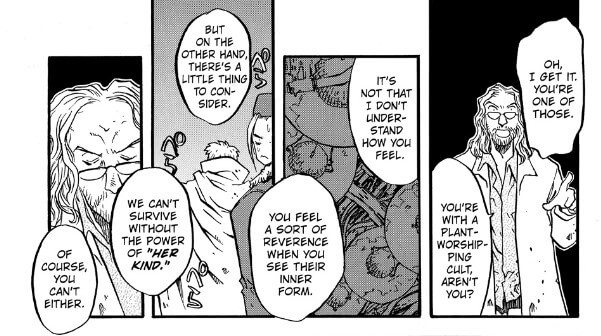
Of course, acknowledging plants as angelic, or as angels themselves, means also realizing Trigun would like us to see Vash and Knives as such since they, too, are plants. In the anime, Rem goes so far as to call Vash and Knives angels to her coworkers on the colony ship, inviting the viewer to make the connection (though the anime doesn’t spend as much time looking at the plants’ true forms). Several times in the manga, Wolfwood is paralyzed with fear in Knives’ presence, and Knives and Vash are both compared to nuclear weapons, acknowledging their immense and terrifying power. In one scene Wolfwood refers to the Gung Ho Guns as monstrous “disciples” gathering around the most powerful religion in the land (Knives). While not all of the Gung Ho Guns have reverence for Knives, they do regard him with awe and fear.
Biblical angels are known for appearing before humans and saying “be not afraid,” to comfort the shaken. Legato evokes this in volume 11 when he stands with Zazie the Beast and tells them, “Be very afraid. You are in his presence.” And Legato is, without question, a man who worships a plant: his lord Knives.
Legato’s Devotion
In the anime and the manga, Legato is completely dedicated to Knives’ service, but the manga spends more time on their relationship. He is unaffiliated with the Eye of Michael, but directs them as Knives’ right-hand man. Legato’s orders are Knives’ orders, and the Eye of Michael follows Knives. Although Legato is not a member of the Eye of Michael, he may be the most openly religious character in the series, using bible verses in reference to his devotion to Knives. In the panel above, for example, (NIV Luke 2:10, But the angel said to them, “Do not be afraid. I bring you good news that will cause great joy for all the people.”) and later, “That is his will. And so it shall be done.” (NIV Matthew 6:10, your kingdom come, your will be done, on earth as it is in heaven.) When we see the moment when they first met, Legato states that he was “born anew,” (NIV John 3:3, Jesus replied, “Very truly I tell you, no one can see the kingdom of God unless they are born again.”) We can see aspects of this already being retreaded in Trigun Stampede, where E.G. Mine says his name was changed from E.G. Bomber when he met Knives and was reborn. Rather than Jesus, it is Knives who they follow to their rebirth.
Elendira, another of Knives’ primary followers, has a conversation with Wolfwood where she denies having blind faith in Knives, simply believing that his path is reality.
Both Elendira and Legato are longtime followers of Knives and have a rivalry for his approval, which they will never earn. Legato is desperate for Knives’ acceptance, but Knives will always look down on him for being human. Knives sees humans as parasites, leeching from the power of the plants that they rely on, insects and sinners. If humans who abuse the power of plants are sinners, Knives will judge them, and Legato will be his right hand.
Knives’ Wrath and Vash’s Mercy
Millions Knives was the cause of the destruction of the colony ships responsible for humans’ arrival on No Man’s Land to begin with. 150 years before the story, he tried to kill all of the humans on their journey to a new home in order to keep them from corrupting the universe any further. Knives sees himself as a plant, and understands that humans’ reliance on plants is essentially slave labor. He resents humans for it. Regardless of whether or not humans created plants, Knives believes plants are entitled to their own lives and autonomy, and using them as energy sources is exploitation. In one scene in the manga, he bows to a wall of plants to “confess his sins” and apologizes for letting so many plants be destroyed in the fall, demonstrating the only ones he feels accountable to are the plants. He has no god but himself and his plant sisters. He sees himself as stronger and better than human beings, and yet still sees them as a threat, calling them “sinners.”
His brother, Vash, is the complete opposite. Vash the Stampede’s mantra of “love and peace” is well known among fans of the series. Vash lives this philosophy, using his abilities to make friends with the local children in every city and also to resolve violent conflicts. He is a pacifist who, again and again, puts his own life on the line in order to de-escalate violence and save lives. He uses a gun to protect himself and others, but he refuses to kill anyone. Vash believes that as long as someone is alive, they can change. In the influential words of Rem, “Your ticket to the future is blank.” (Or, in the anime, “open.”)
In the anime, Vash has a few unique lines about how he disagrees fundamentally with suicide. For Christians, suicide is seen as “self-murder,” not much different from murdering another. It was a mortal sin in Catholicism until 1983. This makes sense given Vash’s perspective on life’s blank ticket, which would be thrown away in a suicide (rather than destroyed in murder). In the manga, however, there is a scene where Vash tries to commit an act of self-harm, probably suicide, but is stopped by Rem. She scolds him for giving up. In a very different context Vash later scolds Wolfwood in the same way.
Despite his peace and love-thy-neighbor philosophy, Vash isn’t Christian himself. Upon visiting graves marked with crosses, Vash bows with his palms together and Wolfwood tells him he’s “in the wrong faith.” Vash counters that he can “put more feeling into it” this way. When he first meets Wolfwood, Vash asks questions about his faith and his job as a priest, implying he doesn’t know much about the details. However, Vash does scold Wolfwood, saying “thou shalt not kill,” in volume 1 of Trigun Maximum, so he appears to have at least a basic familiarity with Christianity. Vash does not see himself as Christian or religious in general. He simply follows his heart, dedicated to doing what he believes is right, which is to protect people and preserve their lives.
The Bible has a lot of stories of contentious relationships between brothers (Cain and Abel, Jacob and Esau, etc) but none of which I think serve as effective parallels to the Knives and Vash dispute. Their difficulties are caused by fundamentally contrasting views caused by the influential time they spent with Rem. After being raised by her on the SEED colony ships, Vash and Knives happen upon the horrors mankind performed upon another plant like them. The shock of it causes Knives to faint, and he awakes with an unshakable grudge. While he slept, though, Vash and Rem underwent the ugly and painful experience of reckoning and taking responsibility for the mistakes of the past.
Forgiveness is at its core an act of freedom, letting go of suffering, and freeing yourself and the ones who have wronged you. I like to think of the gravity of Jesus’ sacrifice in the modern day as a forgiveness of debt, which is easily understood by westerners bound by student loans and medical expenses (“debt” is also used in the NIV translation of Mark 6:12, “And forgive us our debts, as we also have forgiven our debtors.”). Forgiveness means letting go of anything anyone owes us, and anything we owe, so our tickets to the future are blank and open to let us go anywhere. When Rem asks the twins for forgiveness (head down and hands folded together, in a very familiar Christian posture of repentance), Vash forgives her, but Knives never does. For him, all of humanity is shackled with a debt that they owe to plants everywhere, and he becomes obsessed with justice and making the playing field even.
When Knives sabotages the colony ships and causes them to crash into the sandy planet below, Rem sacrifices her own life to save as many humans and plants on the ships as possible. From that moment, Vash seems to understand that every survivor is there thanks to her, and is a testament to her sacrifice. Every single human on the planet can change as long as they’re alive. Their ticket to the future is blank, they can go anywhere, and they have the right to apologize and go on to make things right, like Rem did.
If Jesus’ death absolved humanity and its debts and its sins entirely, you could understand Rem’s self-sacrifice as an act of this same calibre. It was only the beginning of the suffering of the people on No Man’s Land, but Knives chose to destroy the human ships and condemn them to death for the sins of humankind through history. Rem sacrificed herself to reverse course, and hand everyone a blank ticket to see themselves through life. So Vash is Rem’s living will—her disciple—pointing to her and her teachings like Jesus does to God.
In Trigun Maximum volume 1, Sensei and Brad discuss Vash’s penchant to save complete strangers. When Sensei asks Brad if Brad would come to his rescue if he was in danger, Brad says of course, because “we’re kin.” Sensei elaborates saying that’s precisely how Vash feels. “Vash the Stampede’s idea of ‘kin’ stretches way beyond the norm.” In volume 3, Luida points out to Wolfwood that Vash remembers the name of everyone on the floating ship. No matter how he suffers or struggles, she says “He does nothing but nice things.” He has a loyalty to every living thing on the planet, feeling responsible to ensure their future. Every creature is his neighbor. In Matthew 5:43-45 (NIV), Jesus says, “You have heard that it was said, ‘Love your neighbor and hate your enemy.’ But I tell you, love your enemies and pray for those who persecute you, that you may be children of your Father in heaven. He causes his sun to rise on the evil and the good, and sends rain on the righteous and the unrighteous.” No one on the planet is Vash’s enemy, each one is his neighbor and kin.
Vash and Wolfwood
Vash and Wolfwood’s relationship is probably the second most important one that we see in Trigun, as he operates as an equal, or near-equal, to Vash, fighting by Vash’s side for most of the story. Vash and Wolfwood argue constantly about Vash’s ethics about killing, Wolfwood criticizing his ideals as naive and hypocritical with statements like, “Do you think a guy who can’t kill a man can save a man?”; “We’re different from God, right? We’re not omnipotent. Our only alternative is to become demons.”; and “You talk about saving everyone, but you don’t want to get your own hands dirty.”
Although he criticizes Vash, these conversations lead to Wolfwood having his own crisis. He rationalizes that Vash has the ability to act this way because he’s potentially immortal and has the luxury of risking his life, where Wolfwood himself cannot afford to die as a short-lived mortal. The doubts nag at him regardless, and he questions whether someone can change when they already have blood on their hands. In the panel below, Wolfwood observes, “’Til death, the outer road tastes like the outer road.” The word he uses is 外道, which is a Buddhist expression of heresy. In Buddhism, one is to follow the Noble Eightfold Path (八正道) to liberate themselves from the cycle of rebirth, samsara. Buddhists often refer to this simply as the path(道), or the way, translated here as “road.” So another reading of “outer road” would be the “wrong path,” or even “heresy.” Wolfwood is acknowledging that until the end, he’s going to be a sinner. (“Heresy is heresy until you kick the bucket.” Thank you to my friend Lena LeRay, aka Crowbeak, for help with this translation and others.) Why he doesn’t use Christian language here is interesting, but may be because it is Knives who refers to humanity as “sinners.”
This argument escalates until Trigun Maximum volume 3, when in the fight at the floating ship, Vash and Wolfwood face off against Leonof the Puppet Master and Gray the Ninelives. Wolfwood kills several people who pilot Gray. While the duo recover in the hospital afterward, Vash thanks him for doing it. Vash thanks Wolfwood for killing people and saving lives, and doing something he can’t bring himself to do. Vash regrets burdening Wolfwood with his own emotions and regrets, and Wolfwood gets angry at him for it.
In narration, Wolfwood laments that Vash’s words contradict how he feels. Shortly after, at the beginning of volume 4, Vash shows Wolfwood that the people of the floating ship are sending a distress signal to Earth, calling for aid. Wolfwood wonders if humanity can be saved after all. In one of the few times he actually prays, Wolfwood asks God for “hope to reach tomorrow.” On the following page, Earth responds to the distress signals from No Man’s Land. Wolfwood appears to have a change of heart, shifting to follow Vash’s ideology in that moment, believing that maybe he and the people of No Man’s Land can be saved. We don’t see Wolfwood kill another person in the manga after that.
Knives’ Ark
After the battle in the floating city, Vash and Wolfwood meet with Knives. With Legato’s help, Knives isolates Vash and traps him on a ship that Knives unselfconsciously names “the ark.” At this point he begins his pilgrimage to take each of the plants on the planet into his own body, liberating them from human slavery. Plants and his servants, the remaining Gung Ho Guns, are the only ones permitted on the ark. Without the plants, the people on No Man’s Land will die. With the ark, Knives is manufacturing his very own flood, suffocating the people of the planet without water or food. (NIV Genesis 6:13-14, So God said to Noah, “I am going to put an end to all people, for the earth is filled with violence because of them. I am surely going to destroy both them and the earth. So make yourself an ark of cypress wood[…])
Wolfwood falls in with the remaining Gung Ho Guns from the Eye of Michael until he launches a raid on the ark to free Vash. Wolfwood is seriously wounded in the process and we get to see Wolfwood’s internal dialogue as he prays to God, wondering if it’s actually impossible for him to change. It’s Vash who answers, arriving to protect him with his angelic plant powers.
After recovering from this, Wolfwood goes off on his own to return home to the orphanage where he was raised, in the interest of protecting the children from Knives and the Eye of Michael, keen to redeem himself.
In the anime, Wolfwood’s turning point comes when he kills Zazie in front of Vash. When he faces his mentor, Chapel the Evergreen, Chapel juggles an apple and a young Wolfwood struggles to take it. They fight and at the end of their battle, Wolfwood chooses not to kill Chapel, instead taking the apple from his mentor and finally taking a bite from it. By choosing not to kill, Wolfwood takes a bite from the tree of knowledge of good and evil, and he’s shot by his mentor as he walks away. In that moment, his choice to take Vash’s path of mercy results in his death. Gun in hand, he dies in a church. (More on apples later.)
In the manga, as previously noted, Wolfwood doesn’t kill anyone after Gray the Ninelives. He confesses to Vash after they fall from the ark that he shot his mentor, Chapel, to protect the children in the orphanage. Wolfwood took Chapel’s place in the Gung Ho Guns to prevent alarm about his death, and even tried to kill Knives on his own at one point. In both the anime and manga, Wolfwood was appointed as Vash’s guide by Knives, but Wolfwood has no loyalty to Knives at all in the manga, and his loyalty to Knives is questionable even in the anime. In the anime, Wolfwood might be a traitor to Vash, making him a sort-of Judas figure, but in the manga, Wolfwood only betrays the Eye of Michael.
Love and Peace, Hallelujah
The finale of the Trigun is nigh apocalyptic, humans all convened together in one location with the last plants remaining to sustain human life, and Knives on his way to take them. A fleet of human ships fight him from orbit and the people of No Man’s Land and newcomers from Earth work together to try to fracture Knives’ power. Plants, used and abused by humans for so long, are not so sure they want to return to a status quo that exploited them. The burden of peace then falls to Vash, who has traveled the world for 150 years, building relationships with plants and humans alike. He’s the only person left who can communicate with both.
Christology has a concept of the hypostatic union, which refers to Jesus as both perfectly human and perfectly divine. God could enter humanity by going through Jesus and sharing his flesh. In this, God saves humanity actively from among us, rather than through a proxy. I often think of this when I think of Vash and how he is completely human and also, completely a plant. It is through this dual nature that he can communicate with both and build a relationship between two peoples. As the immense collection of plants in Knives’ body begins to fall apart, the planet is showered with feathers, like pieces from the wings of angels. These heavenly wings of the plants are often both beautiful and grotesque, but here the effect is soft, like falling snowy plumage. Each feather wordlessly communicates between plants and humans, transmitting a thought or a memory, finally opening the door between humans and plants. Some of the memories are terrible, the ugly alongside the beautiful, but Vash seems comforted by humanity and plants finally engaging in a conversation, seeing each other as living things with hearts and lives.
Though the Bible values understanding, it prioritizes love above all. Jesus encourages his followers to love thy neighbor, no matter what, whether or not there is understanding. Alternately, in Living Buddha, Living Christ, Thich Nhat Hanh writes that “In Buddhism, understanding (prajña) is essential to love (maitri). Without understanding there cannot be true love, and without love there cannot be true understanding.” Perhaps the finale of Trigun Maximum is a blending of these two philosophies.
As Vash and Knives settle in for their final battle, a plant from Earth fires on them, unable to forgive Knives. The brothers, anxious to resolve their conflict after sixteen volumes, immediately move to save each other instead. Their conflict, based on fundamental disagreements and lost lives, evaporates once the chips are down because they love each other at their core. It probably got out of control because of the love they had for one another. While Vash forgave humans for what they did to plants, Knives could not. But their hearts are still open to forgive each other. Love thy neighbor, and love thy enemy. Using the last of their power, Knives and Vash retreat to safety on feathery angelic wings. With Vash unconscious, Knives leaves him in the care of a human doctor and disappears, leaving behind an apple tree. How fitting for Knives to bestow the fruit of knowledge of good and evil upon No Man’s Land.
At the end of Trigun, we’re told people suspect that Knives and Vash were both killed, but they remain wanted by planet authorities. Police convene outside a church and demand the residents release Millions Knives and Vash the Stampede into custody. Though Knives is gone for good, Vash runs past the crowd and out into the desert under a blue sky, maybe seeming to some as a man resurrected. Life goes on. No Man’s Land is irrevocably changed, many lives are lost, and new humans have arrived. Earth’s efforts to save the people have been foiled, and many lives have been lost, but debts between humans and plants are forgiven, and the ticket to the future is blank.
Author’s Note: I was able to put this essay together thanks in no small part to my friends on Twitter who helped me fund a goal of buying all of the Trigun ebooks in Japanese and English for research and screenshots. My Japanese isn’t very good but checking the original language was interesting and sometimes revealing, such as the blurb for volume 14.
世界中のMANGAファンを魅了したあの大河作品が遂に最終巻を迎える……戦士たちの輝かしい未来にハレルヤ。
でも、ヴァッシュのあの笑顔は誰も忘れる事はないだろう。永遠に……
The final volume of the hit manga that has charmed fans around the world… The warriors’ future is bright! Hallelujah!
But surely no one will forget Vash’s smiling face. Until the end of time…
Around 2010 there were rumors online in English-speaking spaces about Yasuhiro Nightow being a Catholic himself. I looked into it with the best of my ability (thanks to the wayback machine), and I could find no evidence that this was the case. However, the mangaka doesn’t need to be Christian at all to see the beauty in the life of Jesus, just like I do without being Christian.
That “hallelujah” reassured me, at the end of all this work and years of ruminating on this story, that I really was on to something. This essay is not perfect or fully comprehensive, and I also believe that some of these themes were not fully realized even in Trigun itself, but I hope it contributes to the fresh conversations around Trigun, and enriches your own experience of the story. Never stop asking: What Would Vash the Stampede Do?
Our tickets to the future are blank. Hallelujah!

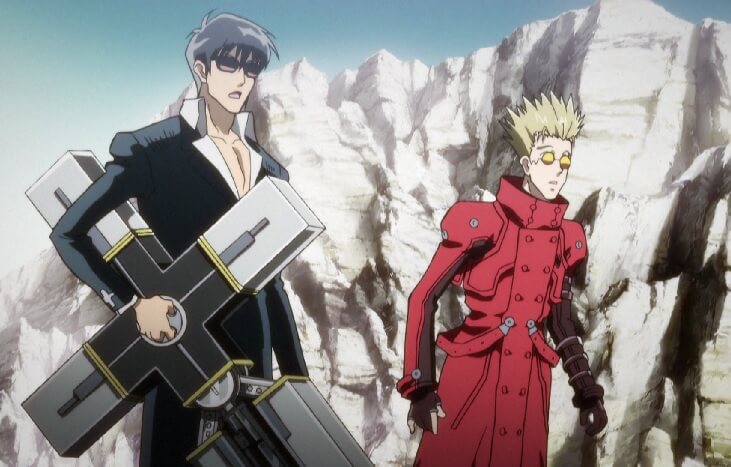
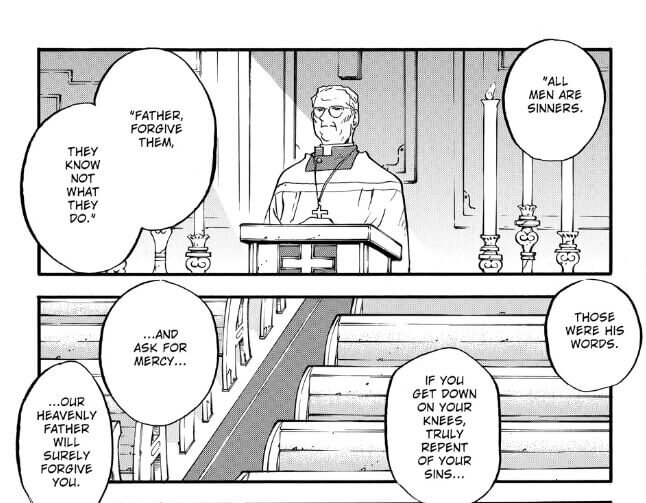
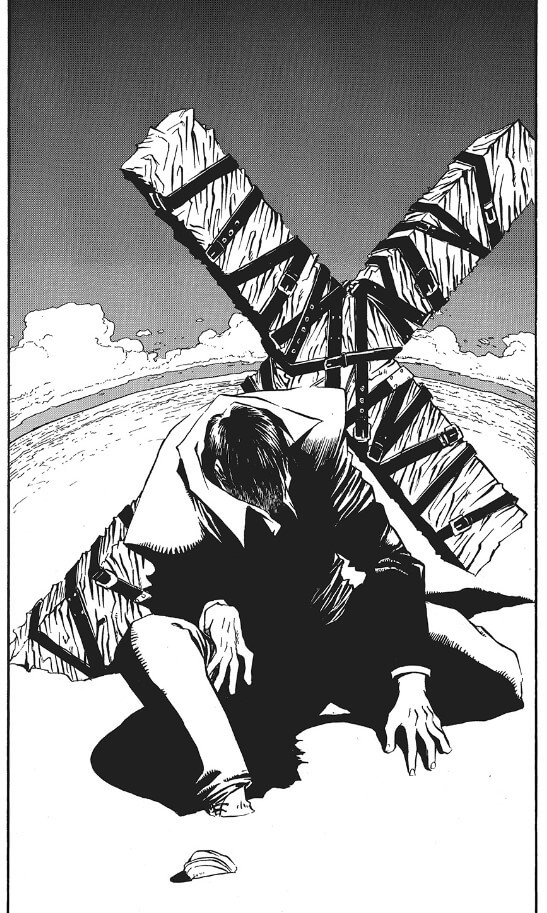
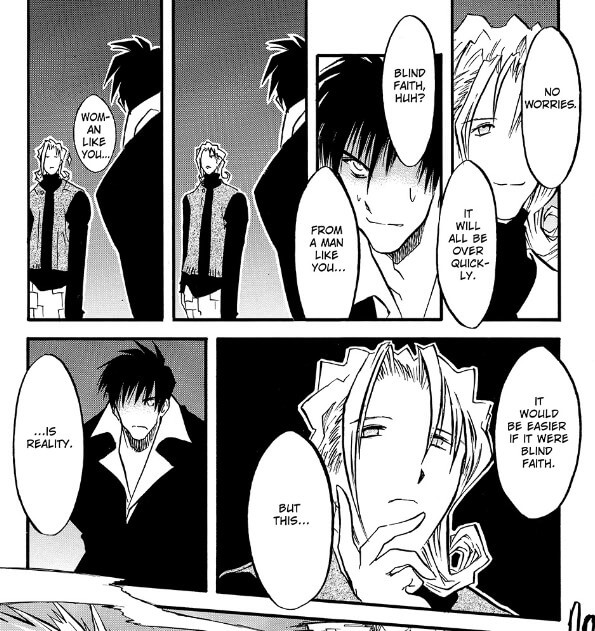
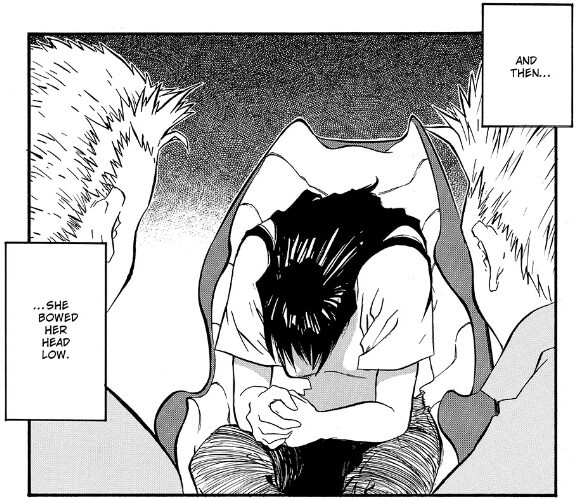
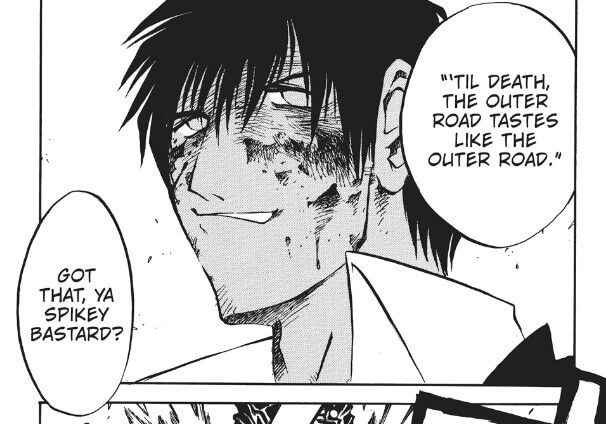
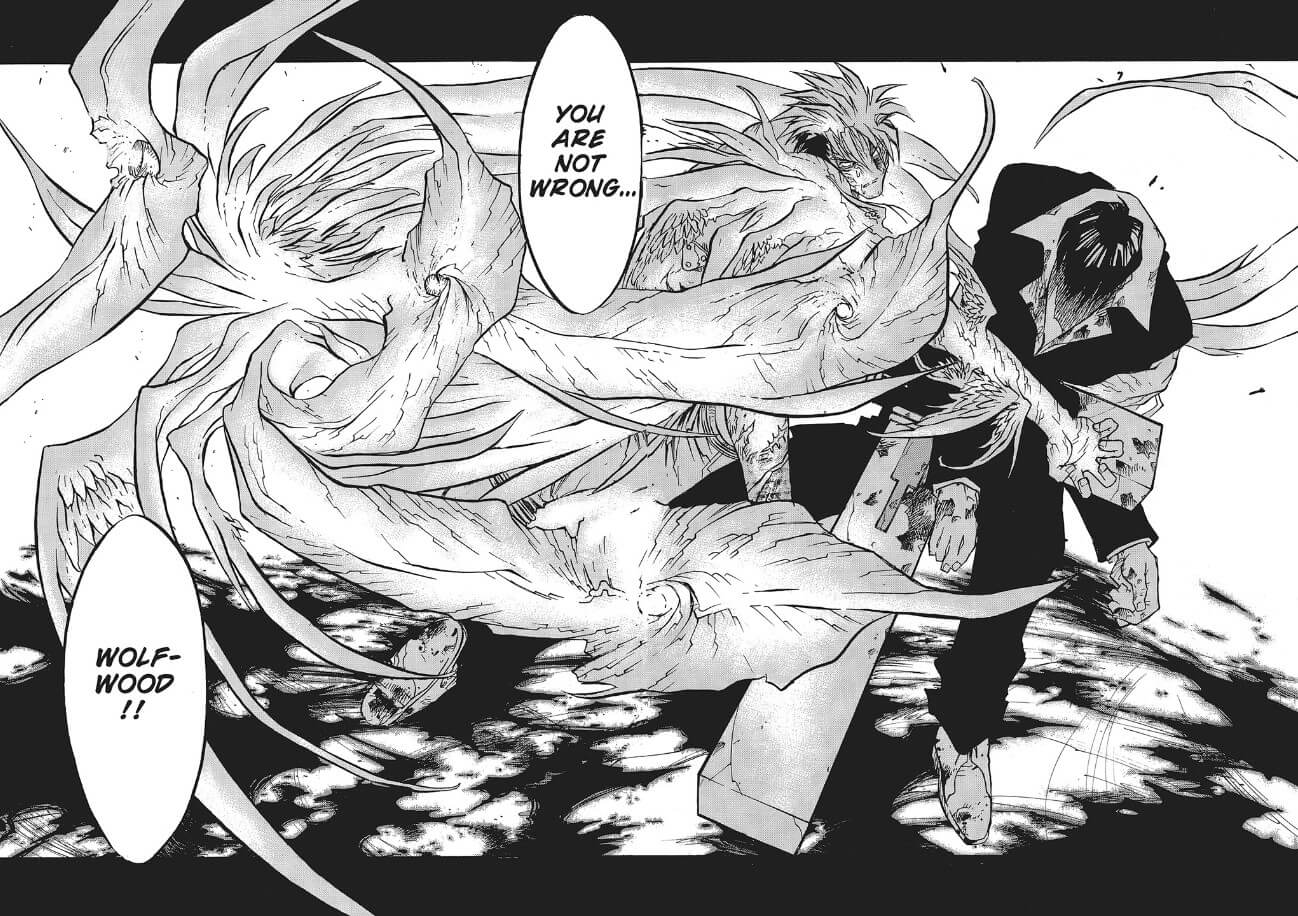
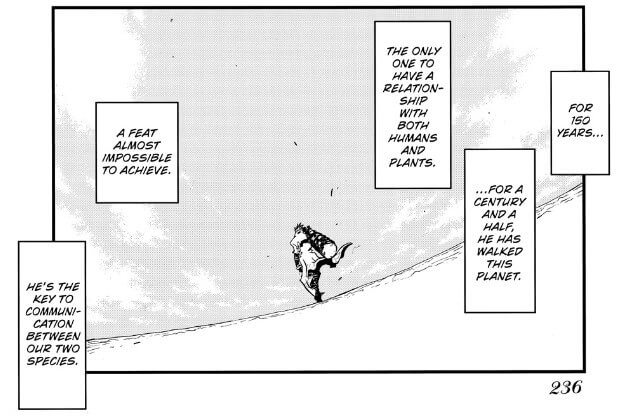
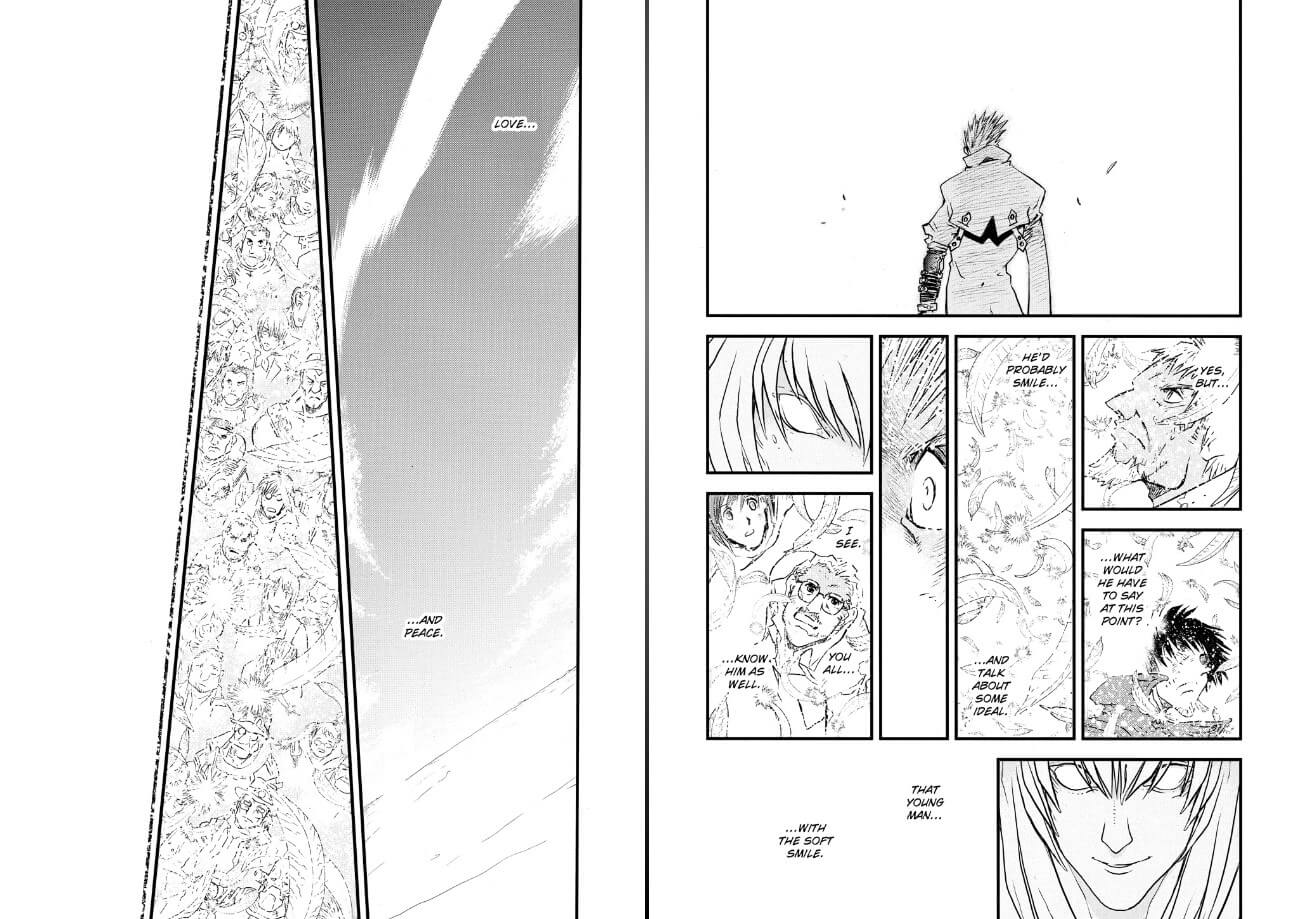

This IS INSANELY AWESOME THIS IS THE TRIGUN ESSAY OF ALL TIME IM IM IM SPEECHLESS THIS IS TOO TOO GOOD TOO GREAT TO BE TRUE I LOVE HOW THIS ENCOMPASSES ALL THESE SUBTLE THEMES GOING ON IN TRIGUN HOW EVERYTHING IS PERFECTLY IN PLACE AND SUFFICIENT THIS IS WHAT I NEEDED THANK YOU THANK YOU THANK YOU THANK YOU THANK YOU!!!!